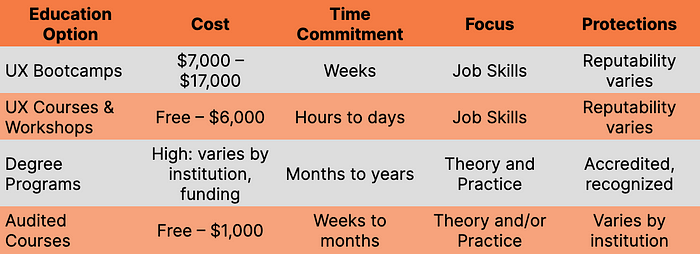UXR bootcamps & alternatives for learning the craft
A close look at the options available to folks transitioning into the field

A bootcamp might seem like the most appealing option for launching your career in UX research.
They position themselves as a way to quickly get you prepared and make you attractive to employers. After all, even if you have a background in a similar field or some transferable skills, odds are you aren’t a perfect match for entry level roles.
But are they the best way to get ready for UX research roles?
The answer depends on your needs and goals, and there are a variety of other options available to you. So let’s unpack some of these and weigh the relative advantages and disadvantages of each.
Different requirements for different roles
The requirements of the role will depend on the specialty you choose.
On small UX teams and in early-stage startups, it’s common to find generalists who are responsible for both design and research. As those teams grow, members tend to diverge into design- and research-focused roles. In mature teams, there are further specialties in accessibility, design systems, research operations, and content writing, among others.
After selecting a target role, you should clarify what employers want in candidates.
For research roles, you can find common themes in in-depth analyses like those by Brian Utesch and Theresa Nguyen, or by Zombor Varnagy-Toth. If you want data more relevant to your situation, you can aggregate the key responsibilities, skills, and preferred qualifications from a sample of job descriptions you intend to apply for. Then compare and collect the most common themes.
Once you have a good understanding of the qualifications and experiences required for your target role, it’s time to assess how your resume compares. Then you’re ready to look at options for filling those gaps.
UX bootcamps and their appeal
Bootcamps are short, intensive programs that focus on job-specific training.
Each program is designed to help students enter a role in tech. The earliest examples were developed for software engineering roles. Today, bootcamps exist for many roles across product development, including product management, digital marketing, data science, cybersecurity, and user experience.
Selecting one tailored to your target role is crucial. While many bootcamps have “user experience” in the title, keep in mind that many are not widely applicable to any role in the field; rather, they are most suitable for aspiring designers. These tend to discuss prototyping and interface design extensively, while covering research methods superficially if at all. That said, there are a growing number of bootcamps designed specifically for UX research, which you can often identify from the title, description, or syllabus.
But even if a bootcamp fills your needs, how should you evaluate them?
Do your homework
While UX bootcamps can serve an important purpose for some jobseekers, completing one comes with some tradeoffs.
For one, bootcamps are not accredited institutions. This allows them to focus on job-specific skills, but also means that instructors may not always be qualified to convey them. Look carefully at the background and experience of the instructors you will be learning from.
They are also costly, with a typical range between $7,000–$17,000. It is common for bootcamps to offer financing options to ease that burden, but bootcamp loans are not subject to the same protections as student loans. Students can sometimes defer tuition by paying a percentage of their eventual salary as part of an Income Sharing Agreement, a controversial practice. Exercise caution before entering into any agreement if you aren’t in a secure financial situation.
To offset the cost, many bootcamps offer job placement assistance. To help you prepare, most will provide resume or portfolio reviews or mock interviews. But some even guarantee a job offer within a period of time after graduation. Be skeptical of overstated promises, and do your own independent research on alumni and the roles they later took. As the old saying goes: if it sounds too good to be true, it probably is.
Finally, it’s always worth exploring alternatives to reach your goals even if you find reputable bootcamps.
Other ways to continue your education
A successful research career requires breadth, which can be challenging to get in an intensive skills-based program.
One alternative is to pursue a degree program in a related field — for example, undergraduate degrees in the social sciences, such as psychology, or a user experience degree, or graduate programs in human factors or human-computer interaction. These programs offer both practical experience and a deeper understanding of the theory foundational to the field.
Those who don’t have the funding or time to commit to a degree can also audit specific courses or take them on a pass/fail basis as a non-degree-seeking student. Local colleges or online courses can both be good options depending on the type of instruction you prefer. Additionally, some graduate programs offer non-degree certificates after taking a limited number of courses.
You can also get some of the benefits of bootcamps on an á la carte basis by looking for workshops, courses, and certifications marketed to UX professionals and those aspiring to join the field. These are generally unaccredited, but hyper-focused on the work you will be doing.
Continuing education may not be the ideal choice for everyone, but it may be an attractive alternative to bootcamps.
Summary

Bootcamps may be appealing for those transitioning into user experience roles, such as UX research.
They can train you in the primary skills for the job in a short period of time, and even offer job placement assistance.
But bootcamps can be controversial, and aren’t the best fit for everyone, whether due to cost, financing agreements, quality of instruction, or unrealistic promises. Another issue is that many only superficially cover research topics.
Keep in mind that bootcamps aren’t the only option. Those interested in seeking another degree might consider undergraduate and graduate programs that offer relevant theory and practice, giving greater breadth and the protections of accredited institutions. Other options requiring less of a commitment include auditing local or online courses, enrolling in a graduate certificate, or taking UX-specific workshops and courses.
What’s best for you depends on your personal situation and goals. If you’re an aspiring UX practitioner, take an honest look at the gaps between the skills and experiences on your resume and those preferred for the jobs you want. Then carefully examine all the options available to you.
If you’ve found this article useful, sign up for Depth by Drill Bit Labs, a free bimonthly newsletter on UX research and digital strategy.

